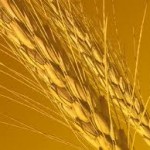Fifth Sunday of Lent – Cycle B
Reflecting on John 12:20-33
I’ve been thinking a lot about wheat lately. I asked my friend Bob, a farmer and horticulturist, to talk to me about the mysteries of seeds and harvests. In a conversation packed with fascinating insights connecting farming and faith he said, “The farmer knows what to expect in the future, because he (or she) has seen what God has done in the past.”
My friend Kathy offered this beautiful reflection on seeds, based on her years of teaching. She said, “I’ve seen so many resurrections happen with my students through the years, and they’re never visible all at once. The child who comes into your class in the fall is silently transformed through the months of the school year into the more confident and accomplished child who leaves your class in the spring. Resurrections are silent things, sacred events begun in the dark earth and not visible to us until the green shoot rises out of the earth.”
Ah, beautiful. No wonder Jesus used a farming image to explain what his death was about to accomplish. When the Greeks coming for Passover—the premier agrarian festival!—asked to see him, Jesus took that opportunity to speak about the eternal life that was about to come from his death.
Unless a grain of wheat shall fall upon the ground and die it remains but a single grain with no life.
Like the husk of grain, we cling to this life because it’s all we know. But there is a secret seed inside us, a soul that has been plotting resurrection quietly throughout our lives. Jesus knew it, and promised it, even as the Cross beckoned.
What things have had to die in order for you to live more fully?
What would YOU like to say about this question, or today’s readings, or any of the columns from the past year? The sacred conversations are setting a Pentecost fire! Register here today and join the conversation.
I have come to light a fire on the earth; how I wish it were already burning (Lk.12:49).


How true that resurrection happens slowly, often we don’t notice unless we are able to look back and see where we have come from. I sometimes want to give up, “it’s no use, I’ll never get this right” but there are small signs just like when the farmer is looking for the first signs of the sprouting wheat.